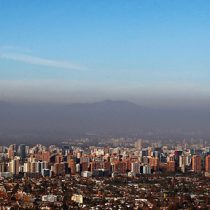
The dangers posed by the Covid-19 coronavirus pandemic has much of humanity confined to their homes. This results in less traffic on the streets, fewer industrial activities and therefore less pollution. It happened in China and is also happening in Chile, specifically in the Metropolitan Region.
Santiago, which until recently listed as the sixth most polluted city in Latin America according to Greenpeace, has yielded air quality rates considered good since the suspension of the classes two weeks ago, the quarantine decreed in seven communes of the region, and the call to stay at home and implement telework. Coincidence?
Hector Jorquera, pollution and air quality expert at the Center for Sustainable Urban Development (Cedeus), told Emol that “if you look at air quality and compare these first three months with those of 2019, there are places in the eastern sector where it has been noticed considerably the low, also in the downtown area like O’Higgins Park.”
“As activity has declined in the city we see a decrease, as the measures begin to intensify their effects will occur,” he added.
“Given the cancellation of the classes, the first thing that was first noticed was that there were fewer vehicle trips. Normally at this time of year, concentrations of particulate matter begin to rise, because the wind is lowering and it is more difficult for the city to be ventilated,” Jorquera explained to the electronic medium.
It is worth mentioning that there is indeed less traffic on the streets, the Ministry of Transport confirmed that the number of passengers in public transport services has been reduced by 80%.
However, transport and industry are not the only sources of pollution in the capital, Jorquera says that there is also a residential factor, which “is not seen yet, because fundamentally it is not cold, but when winter begins they will use the most heating,” the expert clarified.
“Once the pandemic situation is over, the economy will not instantly return to the situation it had, it will not bounce immediately. That’s why it indicates that we’re going to have a year 2020 with less pollution in general in the city,” concluded Héctor Jorquera.
"El reclamo puede ser genuino, pero construido sobre una mentira", apuntó el presidente Javier Milei…
El gobernador de la provincia de Buenos Aires, Axel Kicillof, encabezó un acto en Ensenada…
El diputado nacional de La Libertad Avanza, José Luis Espert, expresó su confianza en la…
Tras la masiva reaparición de Cristina Fernández de Kirchner, el presidente Javier Milei apuntó contra…
El principal propósito de la nueva comisión es evaluar los recursos humanos en el Senado,…
En una medida que busca redefinir las condiciones de los seguros de automóviles en Argentina,…
Esta web usa cookies.